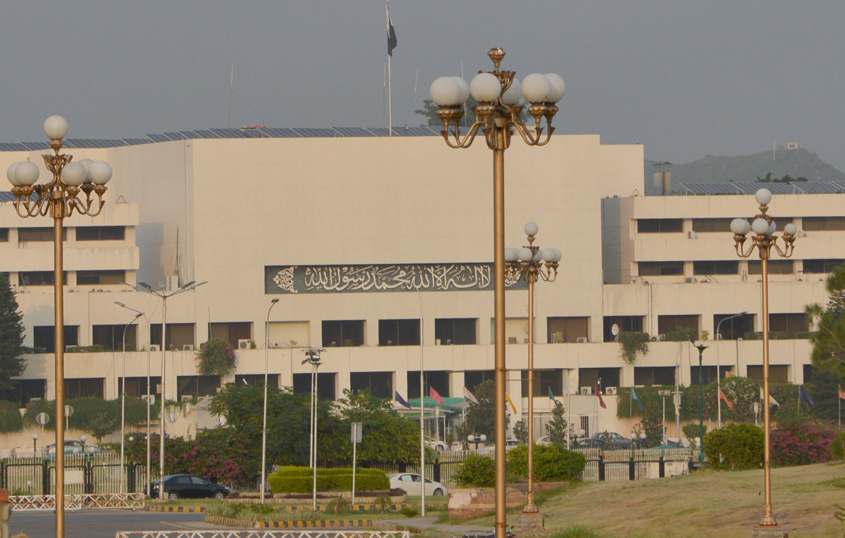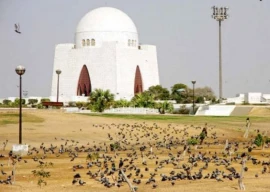
The opposition MNAs found some parts of the Election Bill 2017 – which had been finalised by major political parties after extensive deliberations – to be against the cultural and ethical norms of the country.
The Election Bill, 2017: parliamentary panel finalises draft law on electoral reforms
At the very outset, the National Assembly observed one minute’s silence to express solidarity with the people of Spain over the terrorist attack in Barcelona which claimed 14 lives.
Suspending the Friday's business through a motion, the house started discussion on the Election Bill 2017.
Taking part in the discussion on the draft bill, Syed Naveed Qamar of PPPP suggested improvement in the quality of ballot papers, by implying watermark in it. He also called for providing conveyance to voters on the polling day.
Major reforms approved in Elections Bill 2017
While the proposed bill restricts candidates from providing conveyance facility to voters, Qamar said the voters living in rural areas needed transport – be it a tractor or a trolley – to take them to the polling station. “Don’t make such a law that makes it difficult for them to reach polling stations to cast votes,” he insisted.
The PPPP lawmaker debated against incorporating points which might be used against politicians. “We can’t risk loopholes. We need to take decisions collectively. Who would have thought that Articles 62 and 63 would be implemented, but they were. If you still think nothing will happen then it is an innocent idea,” he said.
Elections Bill 2017: Reforms envisage autonomous ECP
Debating on the draft bill, Dr Shireen Mazari of the PTI said that her party still had reservations over the bill. She said the constitutional amendment and the proposed bill should have been tabled in the house simultaneously, but it did not happen.
Mazari said elections would not be transparent if four demands of her party were not met.
Elaborating, she said that overseas Pakistanis should be given the right to vote otherwise the elections would be meaningless.
Electoral reforms bill: Some provisions may complicate polling process
She said NADRA had given a plan to a sub-committee of the Electoral Reforms Committee that electronic voting for overseas Pakistanis was possible, but they were still talking about the pilot project.
She also demanded reconstitution of the Election Commission of Pakistan (ECP) for holding the coming elections as, according to her, no transparent election could be conducted in the presence of the current commission. She stated that the caretaker government should be selected via the parliamentary committee.
Her fourth point was about biometric verification of voters.
Government committed to electoral reforms: Ishaq Dar
Taking part in the debate, SA Iqbal Qadri of the MQM said that increasing the limit of election expenses and removing slab on the parties by enabling them to spend unlimited funds on elections would eliminate financially poor political parties. He demanded a level-playing field for every contender.
Demanding proportional representation in the election process, Sahibzada Tariq Ullah of the JI said the current framework “denies the poor” and “allows the feudal” to participate in the elections and reach parliament.
Lengthy deliberations: PTI finalises changes in electoral reforms bill
He also demanded removal of the condition from the proposed bill that women were required to cast at least 10 per cent votes for acceptance. However, he admitted that depriving women of casting votes through mutual understanding was a crime.
Warning against touching Articles 62 and 63 of the Constitution, he said their removal would create anarchy in the country.
Criticising the proposed bill for its restriction on women to cast votes, Naeema Kishwar Khan of the JUI-F said the ECP could not force anyone to cast votes at any cost, adding that allotting 5% quota to women contenders was also against the very spirit of democracy and the Constitution.
PTI to push for electoral reforms
Khan asked the government to review the issue of giving access to data – carrying pictures of women – to political agents as it could pose security risk for women.
Due to quorum-related issues, the proceedings of the house remained suspended for some time.
The discussion on the bill will continue on Monday without the question hour, for which a resolution was passed earlier during the sitting.
1731570357-0/elon-musk-(1)1731570357-0-405x300.webp)
-(1)1717678110-0/Kendrick-(1)-(1)1717678110-0-165x106.webp)






1732428532-0/BeFunk_§_]__-(43)1732428532-0.jpg)








COMMENTS
Comments are moderated and generally will be posted if they are on-topic and not abusive.
For more information, please see our Comments FAQ